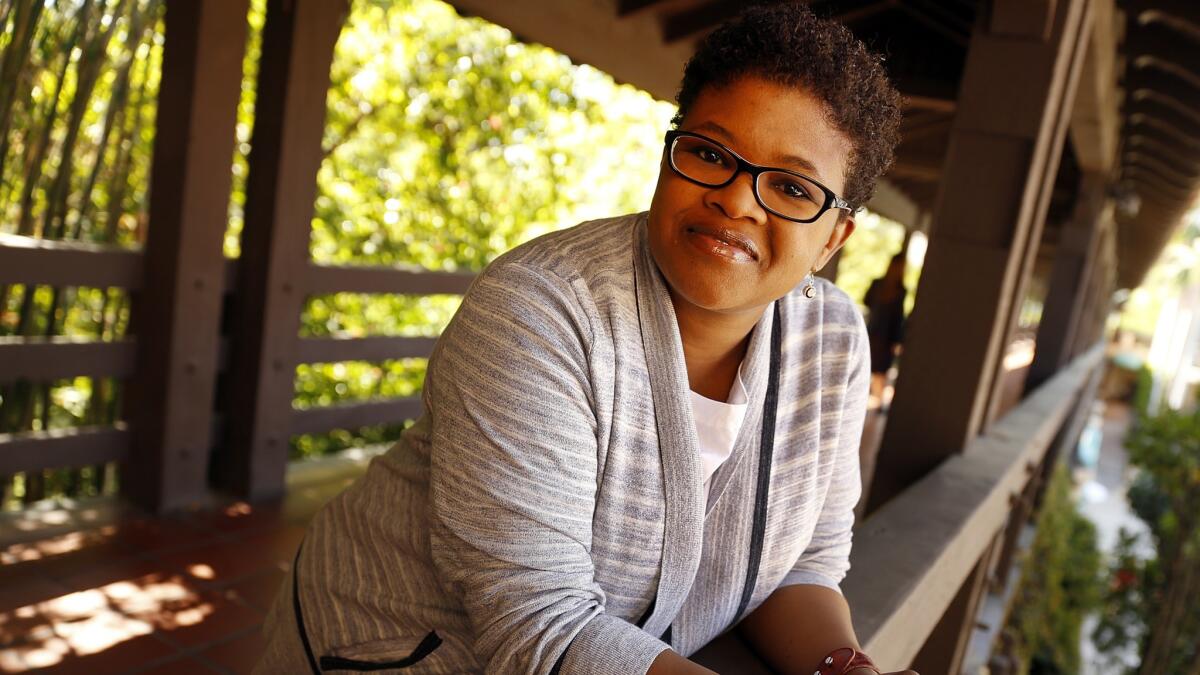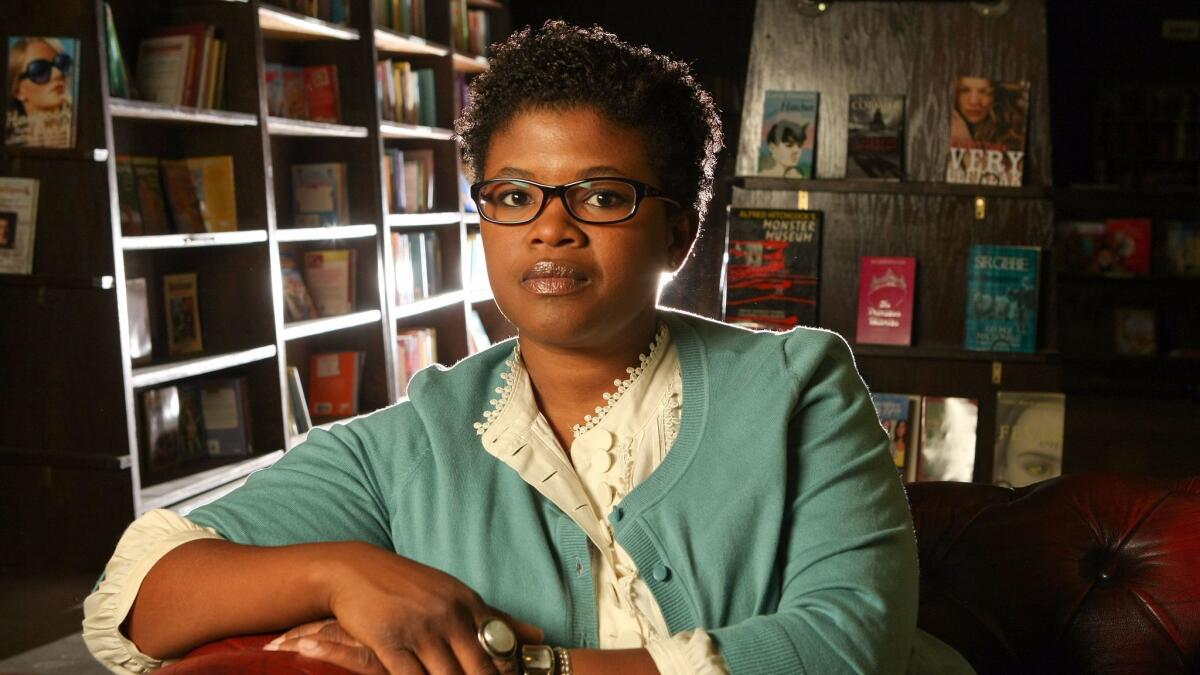Attica Locke lives in L.A., but she writes about what she knows — black life in Texas

- Share via
Few contemporary writers have portrayed black Southern life with as much wit and heart-pounding drama as Attica Locke, whose latest book is the mystery “Bluebird, Bluebird.” Formerly a writer and producer on the television show “Empire,” Locke took the publishing world by storm with her debut legal thriller, “Black Water Rising.” Centered on a black lawyer from Locke’s hometown of Houston, the book won several awards and spawned the bestselling follow-up, “Pleasantville.” She forayed into historical fiction with “The Cutting Season,” a literary mystery that weaves together a murder at a Louisiana historical landmark with the murder of a slave that took place a century earlier. Each of her books combines fast-paced plotting with complex observations about race, class and gender that engage some of the ugliest parts of America’s past — and present.
In “Bluebird, Bluebird” Darren Mathews, a black Texas Ranger, is dispatched to a small East Texas town along Highway 59 to investigate the murders of a local white woman and a black lawyer from Chicago. What follows is a dazzling work of rural noir that throws into question whether justice can be equally served on both sides of the race line. Locke and I spoke via Skype about her latest book, her hometown’s influence on her work, and her thoughts on writing a novel that speaks so profoundly to our current moment.
You grew up in Houston. How much of your book was inspired by the people and places you actually knew?
A lot of it! All of my people, my family on both sides, come from towns along Highway 59. We can trace our roots back to slavery. Family closeness is very much a Southern black family thing, so we would go see cousins and my grandmother and spend lots of time on the highway. I took it for granted at the time, but now I see how all of that — the small cafes, the pine trees, the big houses that looked like South Fork from “Dallas” — has sunk into my unconsciousness and filled it with things to write stories about.
Listening to you talk about your home state I can tell you feel some of the same Texan pride as your characters.
Oh, that pride is in the book. I like to call this book a tale of reverse Great Migration. There are so many stories in our history that have continued the narrative of black folks leaving the South, to get away from Jim Crow and the Klan and to find greater economic opportunities up North. But there’s another story: the story of the people who stayed. I come from those people, and I firmly believe that the black people who stayed down South — in Texas and in Selma, Atlanta, Birmingham — are the people who did the work to move our country forward.
Your protagonist, Ranger Darren Mathews appears to wrestle at every moment with the legacy of Southern history in all its ugliness and triumphs.
I wrestled a lot with my own ambivalence about writing about a black cop. I finally decided to own that ambivalence, to make it a part of his personality and life and how he walks with a badge. It turned out that writing about his ambivalence about being a black Texan was quite easy, because that’s me. I often ask myself how I can have pride in a place that contains so much ugliness, but I almost always end up thinking, “I can’t hate what made me.”
I often ask myself how I can have pride in a place that contains so much ugliness, but I almost always end up thinking, “I can’t hate what made me.”
— Attica Locke
How much did the Black Lives Matter movement influence this novel?
It did influence me, but I was even more influenced by [Jill Leovy’s nonfiction] book “Ghettoside.” It revealed for me how crimes against black people are often under-policed, a phenomenon that’s talked about less than police brutality. That revelation actually led to the construction of Darren’s identical twin uncles in the novel, one a lawyer, the other a Ranger. For me, these two men represent a fracture in the black psyche about where black people belong on the issue of law. It’s a divide that many of us are constantly grappling with: One minute we believe it’s never on our side, and then the next minute we decide we want to believe in the law so that we can love a country that doesn’t always love us back.

It’s interesting to hear you mention psyches, because “Bluebird, Bluebird” reveals a close attention paid to human psychology.
Psychology is foremost in my mind. I’ve been in therapy for 16 years and thank my therapist in every one of my books. I go not just because of what therapy does for me personally but because it helps me as a writer to get a fine-tuned understanding of how psyches are built. When I think about race in particular, I think about what racism does to the psyches of the victim and the perpetrator. To me, bringing everything down to the level of the psyche could potentially be one of the more freeing and effective ways to enact any kind of change.
I’m thinking about the timeline of you writing and publishing this book. You must’ve been writing it before Trump was elected.
It was completely finished by then.
So nothing changed in the book after the election?
Well, everything changed! But I didn’t change anything. Suddenly the book became topical in ways I never expected. I truly thought that the things I wrote about race and the law were only in my imagination, in my worst nightmares, made up for the sake of drama. I thought, “No one’s actually this crazy.” And then, lo and behold, turns out people are that crazy! Let me put it this way: It did not fill me with joy to realize that I had written a topical book.
What’s next for you?
I’m writing a follow-up to “Bluebird, Bluebird” — the second book in what will be called the Highway 59 series. It’s really exciting. One of the things that writing for TV gave me is learning how to hang out with someone for a while and let them grow and change. So it’s interesting doing that with my character Darren. There are also plans to turn these books into a TV series; I have a pilot deal with FX. This is an exciting and sometimes overwhelming time in my life. When I published my first book I had no idea whether anyone would read it, let alone like it, so it’s the thrill of my life to be in a place where I can put on paper for posterity the things that really matter to me and honor where I come from.
Brady is the deputy publisher of Guernica magazine and a senior editor at the Chicago Review of Books.
More to Read
Sign up for our Book Club newsletter
Get the latest news, events and more from the Los Angeles Times Book Club, and help us get L.A. reading and talking.
You may occasionally receive promotional content from the Los Angeles Times.









